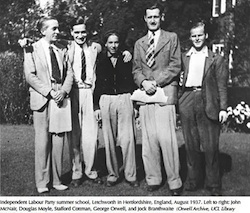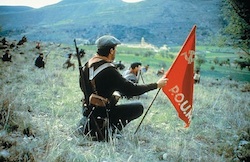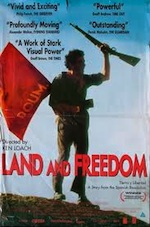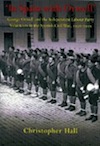CHRIS HALL recalls the life of a genuine, nice guy, ILPer and Spanish Civil War veteran Stafford Cottman.
I feel very honoured to write a brief biography about Staff Cottman – ILP activist, Spanish Civil War veteran, socialist, internationalist, trade unionist, personal friend of George Orwell, Labour Party activist, and a genuine, nice guy.
I first met Staff in 1993 when I interviewed him about his experiences in the Spanish Civil War at his home in Bath. He was happy to answer any questions about his time in Spain. He was very open and not on the defensive which had been my experience when interviewing several ex-International Brigaders. He invited me and my wife to stay the night and when I told him we had booked into a bed and breakfast he insisted we stay for a vegetarian meal as I mentioned my wife did not eat meat.
After this meeting I had many years of correspondence with Staff and his wife Stella until his death in 1999. He held no grudges against former political opponents and, in particular, the Communists who had vociferously called him a traitor when he returned from Spain in 1937 having fought with the ILP and POUM forces.
I got him to sign a book, Volunteers for Liberty, written by Bill Alexander, a commander of the British Battalion of the International Brigade and a Communist Party Great Britain executive member. I already had several signatures of British International Brigaders with the dates of their time in Spain. Staff happily signed with a mischievous twinkle in his eye and under his signature wrote, ‘ILP/POUM 1937’.
We corresponded regularly over the following years particularly about Spain and current British politics. I do remember in 1998 getting an unusually stern letter from Staff after I had criticised the new Labour government. He agreed with my criticism but pointed out the need for realistic expectations and what the alternative would be like. He was a lovely, warm and generous man, and someone I wish I had known for more years.
Socialist Sunday school
Staff was born on 6 March 1918 in Southampton. His father, captain of the only Russian oil tanker in England, died in a car crash leaving Staff’s mother to raise him and his two brothers alone in an artistic household with socialist views. During Staff’s childhood the family moved to London and finally Bristol. Staff left school when he was 14.
An unusual aspect of Staff’s childhood was his attendance at the Socialist Sunday school in Barking, east London. Here they were taught socialism, internationalism and the horrors of the industrial revolution. Staff’s favourite saying of the school was:
“Observe and think in order to discover the truth. Do not think that he who loves his own country must hate or despise other nations, or wish for war, which is a remnant of barbarism.”
As a teenager Staff joined both the ILP Guild of Youth and the Young Communist League, attracted by the anti-fascism of the two organisations. He became aware of the atrocities of Nazi Germany having met German refugees in 1933 and clashed with British fascists in Bristol.
His anti-fascism eventually led to him volunteering to fight in the Spanish Civil War. “My political concerns were more instinctive than analytical,” he said. “I felt a personal disgust that Franco should get military aid from Hitler and Mussolini, whilst Britain and France agreed on a non-intervention policy, which starved the rightful government of Spain of arms and meant Spanish workers bled to death. Surely it must be wrong to do nothing. So I volunteered to fight for the Spanish people on the side of the elected government.”
Staff saw adverts for volunteers in both the New Leader and the the Daily Worker and applied to both to go to Spain. The ILP replied first, so Staff went to its head office where they were more interested in his socialist views than his lack of military experience.
Staff commented: “They asked whether I had military experience with their tongue in their cheek, because what sort of chap would they get with military experience, because there wasn’t much military experience to be had? The only experience of guns I’d ever had was at fairgrounds where you set them up and had a shot.”
Spain
Staff was accepted for the ILP contingent and travelled to Spain in January 1937. In Barcelona Staff found a city in the throes of revolution, with the colours of the revolutionary parties displayed everywhere.
Staff particularly remembered the noise of the city:
“All the various political groups in Catalonia had large brass bands and numerous banners, which were brought to demonstrations, two or three times a week. Everybody seemed to enjoy the noise, display and fun. The bands played ‘The Marseillaise’, ‘The Internationale’ and a rousing anarchist marching song, ‘Hijos del Pueblo’, or ‘Sons of the People’. Our contingent was met at the station and marched to the Hotel Falcon, the POUM headquarters in Barcelona, amid cheers and enthusiasm, and with banners and a brass band.” 
In Barcelona Staff and the other ILP volunteers received two weeks’ rudimentary military training in the Lenin Barracks, and at the front were given weapons that were old and poorly maintained.
Staff served at the front from January to April 1937, when he was sent to the Maurin Sanatorium in Barcelona to help him recover from suspected TB.
Staff remembers sleeping in caves in the mountains of Alcubierre, which were remarkably comfortable, although he dreaded waking up one day facing an enemy bayonet. He also recalled a skirmish involving four Moroccans (elite mercenaries fighting for the fascists) caught in ‘no man’s land’ where they shot one Moroccan dead. The body remained lying on the ground for several days.
On the Aragon front, Staff saw a Spanish youngster being shot and falling forward over the sandbags. Staff dropped his rifle to go to the young man’s aid and then realised he too could be shot, so he remained in cover till the first aid group arrived to carry the young man away. Staff claimed that he fired few shots in Spain because the enemy were too far away and ammunition was in short supply.
The food at the front was poor, and Staff said he left Spain hating rice, sardines and olive oil, although the sweetened coffee and bread were much better. The volunteers regularly talked about capturing Huesca and drinking a coffee there.
“It became a joke that we looked forward to the day when we would capture the town and drink coffee at our leisure,” said Staff. “This was never to be the case and in fact it took me 46 years to have the pleasure of drinking coffee in Huesca in 1983. This was thanks to the BBC and I enjoyed a coffee with Nigel Williams, writer and director of the Arena programme and an Orwell enthusiast.”
While at the front Staff received a letter from the Barking Guild of Youth, asking him if he needed anything. He replied that chocolate was in short supply and later received several tea chests of chocolate. He ate a bar with John McNair, the ILP’s representative in Barcelona, and then sent the rest to the local hospitals.
May Day 37
In May 1937, while on leave in Barcelona, Staff became involved in the ‘May Day events’, when anarchist and POUM militants tried to prevent government forces overturning the revolution. He left the Maurin Sanatorium to help his comrades and was put on guard duty on the roof of the Hotel Falcon, which McNair claimed was healthier for him. He was given a couple of hand grenades due to lack of rifles:
“Now these grenades were the dangerous Spanish phosphorous type grenade, which you lit before throwing,” he rememebred. “They were always considered as much more of a hazard to the user than the recipient.”
Staff slept on the roof of the POUM headquarters for three nights until the fighting started to die down. After the May days Staff returned to the Maurin Sanatorium and was there when a the police raided looking for POUM sympathisers. Staff and another ILP volunteer fled to avoid capture.
As members of POUM were arrested, Staff and the others visited the British consulate for help. Staff was living in the same hotel as McNair, and when the police raided McNair’s room he asked Staff to warn other foreign socialists in Barcelona who supported POUM. One of these foreigners was Willy Brandt, the future German Chancellor. Staff helped George Orwell to destroy some possible incriminating documents, and tried unsuccessfully to get another arrested ILP volunteer released from jail.
He left Spain in June 1937, along with Orwell and his wife, and McNair. During the day Staff, McNair and Orwell pretended to be British businessmen, while at night they slept rough.
The British Consulate eventually got their passports in order but the slow process meant they missed the train to the frontier. Luckily, an anarchist owner of a restaurant close to the station allowed them to sleep in his house till morning. They caught the next train and decided that everyone should read a book on the train, and pretend to be wealthy businessmen or tourists. The group’s luck held once more when police checked their papers and passports and failed to recognise that the 29th Division mentioned in Orwell’s discharge papers actually meant he was with the POUM.
World War
On his return to England he became involved in the ‘Aid Spain’ movement, attending meetings, taking part in door-to-door collections, and visiting the Basque refugees in Street, Somerset.
Staff was expelled from the YCL and his house was picketed by local Communists who accused him of being in the pay of Franco. They even questioned people who entered his house. In the 1980s his friend Don Bateman organised a meeting with Staff and some old YCL comrades who apologised for their earlier actions towards him.
At the outbreak of World War II Staff declared himself a conscientious objector because of his experiences in Spain and the appeasement policy of the British government. But the success of Hitler’s armies forced Staff to change his mind, so he joined the RAF and became a rear gunner. During his time with the RAF he met his future wife, Stella, who was also in the armed forces. He and Stella later had a daughter, Barbara.
After the war the Cottmans moved to Ruislip in Surrey where Staff worked in air traffic control at London airport. In Spain, Staff had become a friend of Orwell and remained his most loyal friend from the Spanish war, even trying to visit him days before Orwell’s death in January 1950. Staff and Stella later moved to Bath where Staff, now aged 70, almost won a safe Conservative council seat because of his local standing.
Throughout his life Staff remained a committed socialist and internationalist. In 1968 he and Stella were in Czechoslovakia during the Prague Spring when Czech leader Dubcek attempted to liberalise the Communist state before being overthrown by Soviet tanks.
 Staff returned twice to Spain after the civil war, first for a holiday in 1960, then in 1983 as a guest of the BBC while they were making an Arena documentary on Orwell. In Staff’s last years he became friendly with the film director Ken Loach and helped him research his critically acclaimed film, Land and Freedom. Many believed the film’s main character was based on Staff. By the time the film was premiered in London, Staff was too ill and frail to attend, so Loach arranged a special screening in Bath with Staff as the guest of honour.
Staff returned twice to Spain after the civil war, first for a holiday in 1960, then in 1983 as a guest of the BBC while they were making an Arena documentary on Orwell. In Staff’s last years he became friendly with the film director Ken Loach and helped him research his critically acclaimed film, Land and Freedom. Many believed the film’s main character was based on Staff. By the time the film was premiered in London, Staff was too ill and frail to attend, so Loach arranged a special screening in Bath with Staff as the guest of honour.
His wife, Stella, wrote: “He watched it in silence and then said, ‘George Orwell always said the truth about what happened to the republican cause in Spain will never be told. But now it has been.’”
Stafford Cottman died on 19 September 1999.
—-
 In Spain with Orwell: George Orwell and the ILP Volunteers in the Spanish Civil War, 1936-1939, by Christopher Hall, 2012, is available from Tippermuir Books for £12.50. Email: tippermuirbooks@blueyonder.co.uk
In Spain with Orwell: George Orwell and the ILP Volunteers in the Spanish Civil War, 1936-1939, by Christopher Hall, 2012, is available from Tippermuir Books for £12.50. Email: tippermuirbooks@blueyonder.co.uk
Christopher Hall’s book ‘Not just Orwell’: The Independent Labour Party Volunteers and the Spanish Civil War was published by Warren and Pell, in May 2009.
See also: Two Hundred Brigadiers Pay Homage to Orwell; Not Just Orwell; and In Spain With Orwell.



11 December 2017
Stafford was my granddads brother. I remember him when I was young coming to the cottage in the New Forest. Being so young I have very little detail from back then so reading this and your comments is heart warming to know how he was held in such high regard.
6 September 2014
I knew Staff in the early 1980’s in Ruislip where he was the Youth Officer from the CLP working with the labour Party Young Socialists. He was a fine man, passionate, sometimes fiery, who would always take people utterly seriously in political debate, no matter how young. I think he loved the youth work because he was very youthful in spirit. In those days you might placed him on the centre-right of the party (which would now be firmly on the left of today’s party of course). To some degree he admired the SDP, but never left Labour. Yet he was instinctively a socialist and even a revolutionary. He detested hypocrisy and hated Stalinism with vitriol, but he engaged with young Trotskyists in the LPYS with seriousness, good humour and affection, and of course he was able to tell them that he was a friend of Ted Grant, founder of ‘Militant’.
He was a wonderful man, sincere, warm and with a wicked sense of humour and an incredibly hearty laugh.
19 August 2013
Interesting. I too got to know Staff in the 80s having been invited by him to speak on the Labour campaign for electoral reform at a Bath Co-op Party meeting. Only after the meeting did I realise who he actually was.
I met with him many times at his and my home, and made a number of recordings with him for teaching purposes. I was struck by his reference to Socialist Sunday School which he explained thus:
“Christians teach their children to make Sunday holy day. Socialists teach theirs to make every day a holy day.”
Yes indeed, a lovely, brave-hearted man, a real hero who, from time to time, I like to think of. Glad to have known him. Teagarden. Haydn Thomas
27 May 2013
Like Tim Powell, I knew Staff in the Bath Fair votes Campaign and I endorse what Tim says. On his death, I wrote to his wife that he was “valiant for truth” and I retain that opinion to this day. I am glad I knew him.
23 May 2013
I had the privilege of working with Staff on the Bath Fair Votes Campaign in the early 1990s. He combined an undimmed commitment to high ideals with good humour, tolerance and a realism untainted by any hint of cynicism.